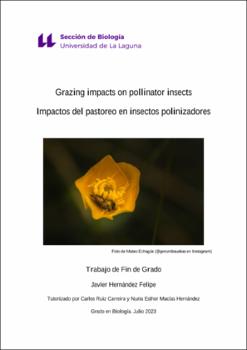Grazing impacts on pollinator insects
Autor
Hernández Felipe, JavierFecha
2023Resumen
Los polinizadores son cruciales para los ecosistemas naturales y agrícolas. Sin
embargo, la mayoría de grupos de polinizadores están en declive debido a varios factores antrópicos como la intensificación del uso del terreno. El pastoreo supone el mayor uso del terreno a lo largo del planeta, y afecta a los polinizadores reduciendo su principal
fuente de alimento. En las islas Canarias, el pastoreo ha sido una actividad desde que los
primeros humanos llegaron a las islas, pero sus efectos en los frágiles ecosistemas del
archipiélago no han sido analizados en profundidad. En este estudio, se colectaron
polinizadores mediante el uso de pan traps en diferentes localidades pastoreadas y no
pastoreadas a lo largo de diferentes unidades de vegetación, y se tomó información de
otras variables que podrían explicar la interacción con el pastoreo. Los resultados
revelaron que el pastoreo tuvo un impacto negativo en los insectos polinizadores.
Además, un análisis de GLM mostró qué variables predecían mejor nuestros resultados.
Este efecto negativo puede deberse principalmente a la corta historia del pastoreo y a la aridez de la isla. Pollinators are crucial for natural and agricultural ecosystems. However, most
pollinator groups are in decline due to several anthropic drivers such as the land use
change and land use intensification. Grazing is a major driver of land uses change across
the world and affects pollinators reducing their main supply. On the Canary Islands, grazing has been an activity since the first settlers arrived, but their effects on the fragile
ecosystems of the archipelago have not been analyzed. In this study, we collected pan
traps from different grazed/ungrazed localities through different vegetation units, as well
as other variables that could be interacting with grazing. Several analyses at R software
were made. The results revealed that grazing had a negative impact on insect pollinators.
Moreover, a GLM showed what variables predicted better the results. This negative effect could be mainly due to the short history of grazing and the aridness at the island.





